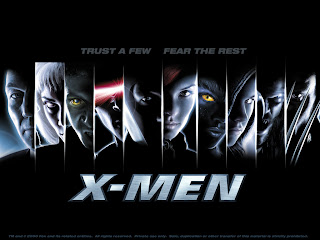Superheroes, X-Men
Thanks for all the comments last night. I thought it was an interesting discussion of the material, and I appreciate all those that came out. Below is a few of my thoughts on "X-Men."
A lot of Comic Book properties seek to illuminate readers and the public on some issue or idea, but few are as politically charged as "X-Men." Since its inception in the 1960s, the comic has come to stand for a lot of different ways we look at the idea of acceptance, persecution, and the way our society reacts to things that are different.
In the past, "X-Men" has served as a social commentary on racial, ethnic, and cultural division in our country. Charles Xavier has been compared to Martin Luther King, Jr., while Magneto has been compared to the more radical Malcolm X. Those aren't perfect comparisons, but it's interesting to see how this has taken on life and been a part of a comic book and the film series that was made from it.
Throughout its history, the X-Men narrative has mirrored history. Some of that includes the McCarthy era persecution in our own country, references to the Holocaust and Ku Klux Klan, and a storyline that mirrored apartheid in South Africa. The X-Men have also looked at religious persecution — including a storyline in the 1980s that featured a group that believed mutants were children of the devil and had to be exterminated.
X-Men writer Chris Claremont said, "The X-Men are hated, feared and despised collectively by humanity for no other reason than that they are mutants. So what we have here, intended or not, is a book that is about racism, bigotry and prejudice."
More recently, the X-Men have been seen as mirroring the struggle of the LGTB community. Some commentators have noted the similarities between the struggles of mutants and the LGBT community, noting the onset of special powers around puberty and the parallels between being closeted and the mutants' concealment of their powers. In the comics series, the X-Men broke ground with the marriage of openly gay character Northstar in 2012. Additionally, It has been said that the comic books and the X-Men animated series delved into the AIDS epidemic with a long-running plot line about the Legacy Virus, a seemingly incurable disease thought at first to attack only mutants, similar to the AIDS virus which at first was spread through the gay community.
I believe the Bible is quite clear on same sex relationships, and our church and denomination have taken a clear stand on this issue. I don’t bring that up to stir up controversy but rather to provide some context. Singer, who directed the “X-Men” film, is openly gay. He said of the X-Men, “that the X-Men franchise has served as a metaphor for acceptance of all people for their special and unique gifts. The mutant condition that is often kept secret from the world can be analogous to feelings of difference and fear usually developed in everyone during adolescence.” Knowing the background, beliefs, and passions of someone who helped create the film can provide a context for understanding the worldview that underlies the action on the screen.
So the question with all these stories is what positive can we take away from this. Obviously we might not agree with the political and social undertones of the narrative, but I think there is something we can take from this and apply to the way we, as Christians, engage with the world.
Jesus was asked what the greatest commandment was. He responded, “Jesus replied: “‘Love the Lord your God with all your heart and with all your soul and with all your mind.’ This is the first and greatest commandment. And the second is like it: ‘Love your neighbor as yourself.’ All the Law and the Prophets hang on these two commandments.” (Matthew 22:37-40). The idea is that we love our neighbors as ourselves. This doesn’t mean we show love to those who agree with us, or those who share our beliefs, but that we show love to everyone. That also doesn’t mean we accept everyone’s beliefs as if they are truth or correct, but we can still show love to them.
One of my favorite verses about our response as Christians comes from the Apostle Paul in the book of Colossians. He says, “Therefore, as God’s chosen people, holy and dearly loved, clothe yourselves with compassion, kindness, humility, gentleness and patience. Bear with each other and forgive one another if any of you has a grievance against someone. Forgive as the Lord forgave you. And over all these virtues put on love, which binds them all together in perfect unity.” (Colossians 3:12-14). We see in “X-Men” a reflection of the societal response to those who are different — which is to shun them, to be fearful of them, and to treat them poorly. That has been the response throughout the whole of human history. As Christians, I believe we are called to respond differently. That doesn’t mean we accept their beliefs and positions as true, but it does mean we show Christ’s love and compassion to them.




Comments
Post a Comment